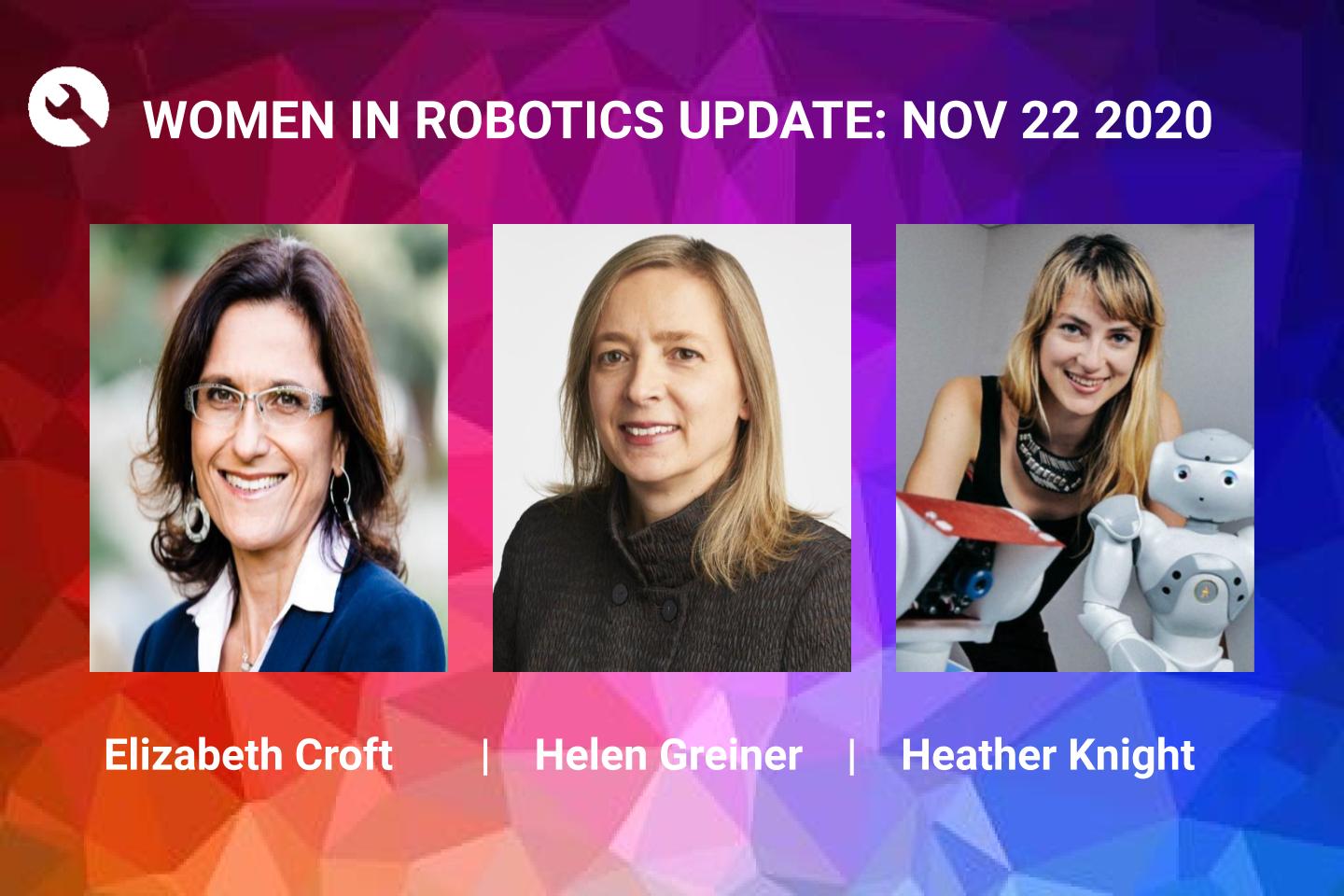
“Fearless Girl should provide the spark to inspire more female engineers”, writes Elizabeth Croft, Dean and Faculty of Engineering at Monash University.
“Girls are natural engineers, highly capable in maths and physics. We need to show them that these tools can be used to design a better world.So far, we’ve done a poor job of communicating to girls the very powerful impact they can make through an engineering career.” Croft continues, providing us with the inspiration to introduce the second of our new series of Women in Robotics Updates, featuring Elizabeth Croft, Helen Greiner and Heather Knight from our first “25 women in robotics you need to know about” list in 2013.
 |
Elizabeth Croft
Dean and Faculty of Engineering at Monash University
Elizabeth Croft (featured 2013) is now a Dean and Faculty of Engineering division at Monash University in Australia, advancing human-robot interaction, industrial robotics, trajectory generation and diversity in STEM. Previously she was the Founding Director of the Collaborative Advanced Robotics and Intelligent Systems Laboratory at the University of British Columbia (UBC). As the Marshall Bauder Professor in Engineering Economics, Business and Management Training from 2015-2017, she launched the Master of Engineering Leadership degrees at the UBC. Recognized as one of the 100 most powerful women in Canada in 2014 by Women’s Executive Network, Croft also received the RA McLachlan Peak Career Award for Professional Engineering in the Province of British Columbia, Canada in 2018. She is a fellow of the ASME, Engineers Australia, Engineers Canada, and the Canadian Academy of Engineering. She is also the recipient of other awards such as the Wendy MacDonald Award, Diversity Champion, Vancouver Board of Trade of 2016, and Just Desserts Award of University British Columbia, Alma Mater Society in 2015. She has more than 200 research publications and almost 6000 citations. She is an advocate for women in Engineering and has an exceptional record of propelling women’s representation and participation in engineering. As the Natural Sciences and Engineering Research Council Chair for Women in Science and Engineering (2010-2015), she worked with partners in funding agencies, industry, academe, and the education system on comprehensive strategies to improve women’s participation and retention in the STEM disciplines at all levels. During this period Croft successfully increased female enrollment in Engineering to 30%. |
 |
Helen Greiner
CEO, Cofounder and Founder of Tertill, iRobot and Cyphy Works
Helen Greiner (featured in 2013), is now a founder of Tertill , in addition to founding iRobot and CyPhy Works (aka Aria Insights). Tertill is a solar-powered, weed-snipping robot for home gardens patrolling throughout the day and looks somewhat like an outdoor Roomba, one of the products from iRobot, the world’s first commercially successful consumer robotics product. Greiner has received numerous awards and accolades, including being named an “Innovator for the Next Century” by Technology Review Magazine. She received the DEMO God Award at the DEMO Conference in 2014 and was named a Presidential Ambassador for Global Leadership (PAGE) by US President, Barack Obama and US Secretary of Commerce, Penny Pritzker. She was recognized for leadership in the design, development, and application of practical robots by the National Academy of Engineering, and was named “woman of the year” at Wentworth Institute of Technology in 2018. In 2018, she was also sworn in as a Highly Qualified Expert for the US Army. You can hear her speak in 2021 at the finals of the $2m GoFly competition . As a child Greiner became fascinated by the robots of StarWars, particularly the three-foot-tall spunky R2D2. Says Greiner “He had moods, emotions, and dare I say, his own agenda. This was exciting to me—he was a creature, an artificial creature.” Consistently pioneering in building the helping robots to perform dull, dirty and dangerous jobs and launching robotics into the consumer market since 2008, she says, “If we don’t take robots to the next level, we’ll have a lot of explaining to do to our grandchildren.” |
 |
Heather Knight
Assistant Professor at Oregon State University
Heather Knight, (featured 2013) is now an Assistant Professor in the Computer Science department at Oregon State University and directs the CHARISMA* Research Lab. In CHARISMA Research Lab, she operationalizes methods for the performing arts to make more emotive and engaging robots, exploring minimal social robots, robot ethics, charismatic machines, and multi-robot/multi-human social interaction. Knight has presented a TED talk: Silicon-Based Comedy in 2010 where she demonstrated a robot stand-up comedian “Data” which has gotten almost 1 million views. She was mentioned in Forbes List’s 30 under 30 in Science and named one of AdWeek’s top 100 creatives in 2017. In 2017, she was also a Robotic Artist in Residence at X, the Moonshot Factory. Her installations have been featured at the Smithsonian-Cooper Hewitt Design Museum, TED, Pop! Tech, LACMA, SIGGRAPH, and the Fortezza da Basso in Florence, Italy. She is also the Assistant Director of Robotics at Humanity+ and a fellow at the Hybrid Realities Institute and a National Science Foundation (NSF) Fellow. She is also a founder of Marilyn Monrobot, a robot theater company performing comedy, dance and even Rube Goldberg Machine installations. Here, she successfully organizes the annual ‘Robot Film Festival’ which awards Botskers to various robot films and robot film stars. The film archives make for great viewing. |
Want to keep reading? There are 180 more stories on our 2013 to 2020 lists. Why not nominate someone for inclusion next year!
And we encourage #womeninrobotics and women who’d like to work in robotics to join our professional network at http://womeninrobotics.org


